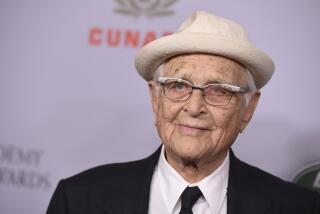Intimate Friends, Relatives Remember Norman Cousins
- Share via
At a recent celebration of the late Norman Cousins’ life, 15 of his friends, colleagues and relatives recalled him with warmth and admiration and told how his life had touched theirs.
Dr. Franklin Murphy, host of the gathering of hundreds in UCLA’s Royce Hall, observed that Cousins was “an uncommon man, brilliant of mind and full of compassion for his fellow man” but added, “I would like to take note of his sense of humor. He was a complete human being, not just a serious and competent human being.”
For 25 years Cousins edited the Saturday Review of Literature, influencing the intellectual life of the nation; for the last 15 years he had been an adjunct professor of medical humanities at UCLA Medical School, specializing in the effects of the mind and the emotions on the body.
I would like to preserve a few of the stories told about Cousins’ sense of humor, which brightened his life and the lives of those about him. He seems to have known everyone in the world--from Albert Schweitzer to Albert Einstein, from Benny Goodman to Leonard Bernstein.
Dr. Sherman M. Mellinkoff, former dean of the UCLA School of Medicine, recalled that the great operatic composer Rossini was a friend of the composer Giacomo Meyerbeer. When Meyerbeer died, his ambitious nephew composed some music for the funeral, knowing Rossini would be there. After the ceremony the nephew asked Rossini, “How did you like the music?” Rossini replied, “It would have been better if you had died and your uncle had composed the music.”
Mellinkoff said he knew how the nephew must have felt.
David Mathews, president and CEO of the Charles F. Kettering Foundation, recalled Cousins’ service in seeking sane relations between the United States and the Soviet Union.
The story is, he said, that President Eisenhower said to Cousins: “ I can’t talk to the Soviets. Somebody has to.”
Actually, Mathews said, Cousins probably said to Eisenhower: “Mr. President, you can’t talk to the Soviets. Somebody has to.”
Screenwriter Sy Gomberg recalled that he and Cousins often played golf in the same foursome. One time at Rancho Park, he said, they were following a foursome from Iowa--mother, father and two sons. The mother kept looking back at Cousins, he said. Finally, before teeing off at the last hole, she ran back toward Cousins and said, “I’ve been wondering--aren’t you somebody?”
Cousins said, “Yes. I’m Charles Laughton.”
The woman shrieked. “I knew it! I’m sorry. I should have recognized you.”
Cousins said. “That’s all right. You can call me Charley.”
He loved practical jokes, but there was never a victim.
Gomberg also recalled a party at which Cousins arrived heavily disguised as a Russian scientist, with full beard, ill-fitting suit and a full head of hair. No one recognized him. They kept waiting for Cousins to appear.
Meanwhile, Cousins, as the Russian, argued in a heavy accent that Americans had stolen baseball from the Soviets and degraded it because they didn’t play it in the snow; he also said the Russians were ahead of America in automobiles because they knew how to make them run on cabbage. He wasn’t found out until he pinched a woman in the rear and she knocked his wig off.
Norman and Ellen Cousins’ daughter, Candis Cousins Kerns, recalled that it was traditional for her father to dress up as Santa Claus on Christmas and walk down the stairs into the living room. This happened, she said, until it was obvious that the children did not believe in Santa anymore.
Then one Christmas, a gorilla appeared in the house. The girls saw that it was wearing their father’s shoes and were reassured. Suddenly, Cousins himself appeared on the other side of the room, in ordinary clothes. He looked at the ape and exclaimed, “It’s a gorilla!”
“The gorilla, of course,” said Mrs. Kerns, “was mother.”
Tom Middleton, whose wife is Norman’s sister Jean, recalled that when he first met Jean he told a friend about her and the friend exclaimed, “God has a sister?”
Dr. Bernard E. Simon, clinical professor emeritus of surgery at the New York Mt. Sinai School of Medicine, was one of a team of New York surgeons who performed plastic surgery on 25 young Japanese women disfigured in the Hiroshima bombing.
Norman Cousins had organized what was known as the Hiroshima Maidens Project. More than 130 operations were performed on them over a period of 18 months. As Dr. Simon said, the scars could not be healed entirely, but the women went home “with heads held high, full of fun and spirit.”
One of the women, Shigeko Sasamori, also spoke at the ceremony. She had been adopted by the Cousins family. “When my son was born,” she said, “Father Cousins named him Norman Cousins Sasamori. I’m very proud of the name.”
More to Read
Sign up for Essential California
The most important California stories and recommendations in your inbox every morning.
You may occasionally receive promotional content from the Los Angeles Times.













